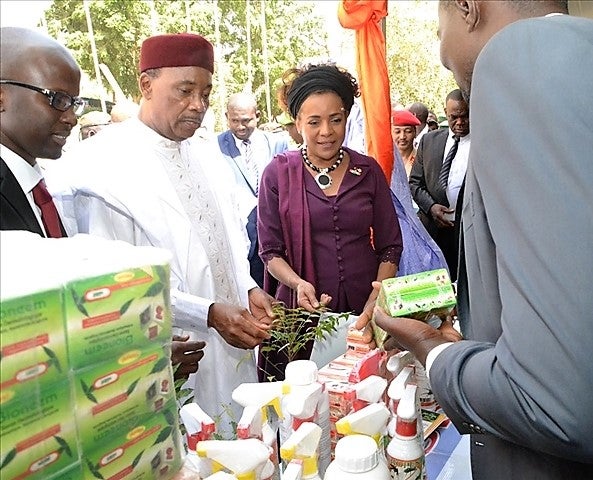Also available in: Français
In a first for Africa’s Sahel region, entrepreneurs from Senegal to Chad assembled in Niamey, Niger, for the SahelInnov Expo last month to showcase their businesses and exchange ideas. From livestock to drones, all sectors were on display as a new generation of entrepreneurs and start-ups emerges with bold and innovative ways to address the challenges facing their countries and communities. Increasingly recognized as a strategic path to economic growth, supporting SMEs and entrepreneurs has a key impact on development and is generating more interest from governments in the Sahel. 
Michaëlle Jean, the Secretary General of the International Organisation of La Francophonie, His Excellency Mahamadou Issoufou, the President the Republic of Niger, and Almoktar Allahoury, the CEO of CIPMEN.
Photo Credit: CIPMEN
Hosting the event was Niger SMEs Incubator Center (CIPMEN) whose CEO, Almoktar Allahoury, lauded the initiative. “This is the first time all stakeholders have come together: entrepreneurs, public officials, investors, academia and development partners in one place to discuss the many opportunities and remaining obstacles for the private sector — this is just what we need to take the region to the next level.”
Indeed, entrepreneurship could be especially important for this extremely poor region, with half the population living below the poverty line. Burkina Faso and Niger, for example, are among the fastest-growing economies in the world, yet their GDP per capita are just $395 and $652 respectively, compared to the Sub-Saharan African average of $1,647. A vibrant and active entrepreneurial ecosystem would therefore not only boost economic diversification and improve productivity, it also could prove the vital lever to tackling two of the Sahel’s biggest challenges: youth unemployment and climate change.
The devastating combination of climate change, mass migration, trafficking and the rise of violent extremism has resulted in recurring humanitarian crises and massive food insecurity, affecting more than 20 million people across the Sahel in 2015. Enduringly high birth rates, furthermore, will require millions of jobs to be created to respond to the needs of a rapidly growing and increasingly young population. Institutional reach remains weak and a state of protracted insecurity has taken root over vast swathes of territory.
Despite this difficult backdrop, some economic actors are able to function in areas otherwise cut off from government services due to security or capacity constraints. This is a particular boon to the Sahel, where local entrepreneurs are uniquely placed to understand and respond to local populations’ needs, providing affordable solutions for the most vulnerable and lowest-income populations. 
Diakite Robotics is a Bamako-based company that provides innovative automation solutions and systems integration services such as 3D printing of spare parts.
Photo Credit: Abdoulaye Diakite
Economic development in the region has historically been driven by agriculture and extractive industries, but this will not be enough in the context of an urbanizing Sahel and falling international commodity prices. By improving the investment climate and by encouraging an ascending business class, market-based solutions can address unemployment, economic growth and poor service delivery, especially in rural areas and among marginalized groups. This includes women, whose labor-market participation rates in some Sahelian countries are among the lowest in the world. Providing viable alternatives to reduce prevailing widespread poverty and inequality will build resilience over the long term and will be a key path to bringing stability to the region.
In order to kick-start these entrepreneurial ecosystems just as they emerge, SahelInnov is connecting CIPMEN to incubators in six other countries in a regional platform that will facilitate access to credit and markets, in addition to allowing businesses to benefit from the experience of others through peer-to-peer learning and mentorship.
“This couldn’t come at a better time,” says Christian Jekinnou, program coordinator of Afrique Innovation. “Three years ago, there was just one incubator in the whole region and now there’s at least one for every country represented. Now is the time to connect and support them.”
This is where the donor community comes in. Building on the momentum of SahelInnov, the World Bank Group is promoting business development across the region and accompanying young entrepreneurs as they embark on their journey. Jambar Tech Lab at CTIC Dakar is a breakthrough infoDev-supported regional initiative that seeks to provide aspiring entrepreneurs with the necessary building blocks for their businesses. Expanding such initiatives and — crucially — adopting a regional perspective is a unique approach to addressing common obstacles and secure collective solutions to the Sahel’s problems. Budding businesspeople will benefit from incubation programs as they navigate complex, unstructured markets with the goal of expanding their operations. Bootcamps and competitions will identify and structure promising start-ups, providing expertise and building both the hard and soft skills necessary to overcome their difficult environment.
Awardees of the business competition and app challenge during SahelInnov.
Photo Credit: CIPMEN
Supporting ecosystems as they mature, furthermore, will require addressing financing needs. “Some equity financing is finally becoming available at the SME/start-up level,” says Olivier Furdelle, managing director of Dakar-based Teranga Capital, “but donors can play a big role in speeding up the process of democratizing access to seed capital for innovative businesses.”
There may be no silver bullet for the multifaceted challenges the Sahel faces, but providing the next generation of entrepreneurs with the resources to expand their businesses is a good place to start. Inclusive job creation, particularly in fragile contexts, will be essential to fostering broader economic and human development in the region as it emerges from crisis mode. A thriving Sahel will be one in which the private sector and entrepreneurship play a much more significant role than in the past.
Related Links:
- Region: Africa Innovation Program – AfricInnov, SahelInnov, Jambar Tech Lab
- Niger: CIPMEN
- Senegal : CTIC Dakar, Teranga Capital
- Mauritania: Hadina RIMTIC, iLab/JCCM and Mauritanian Business Center,
- Mali: Impact Hub, CREATEAM and Teteliso
- Burkina Faso: La Fabrique
- Chad: Wenaklabs
- Guinea: Saboutech
- infoDev



Join the Conversation